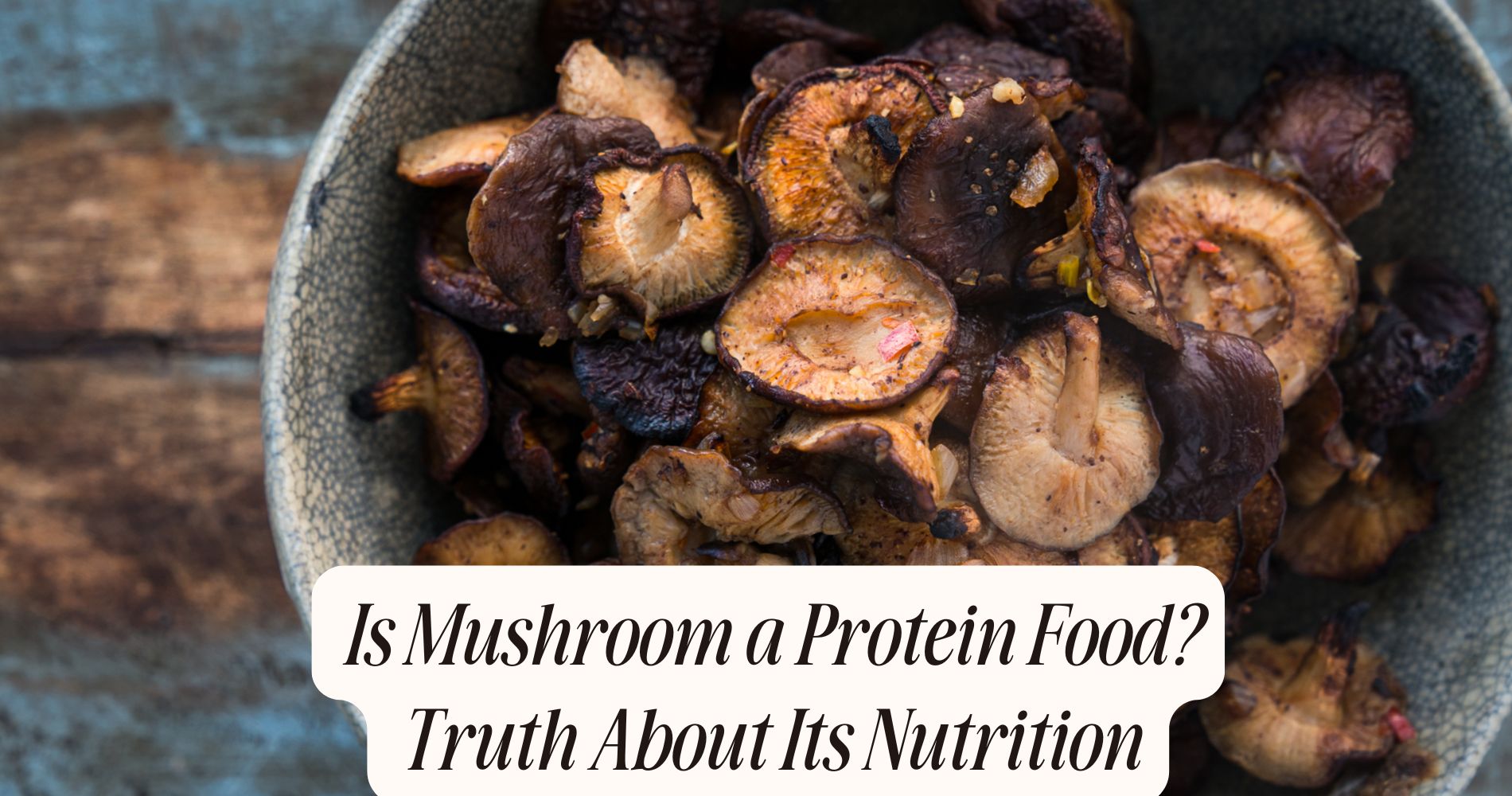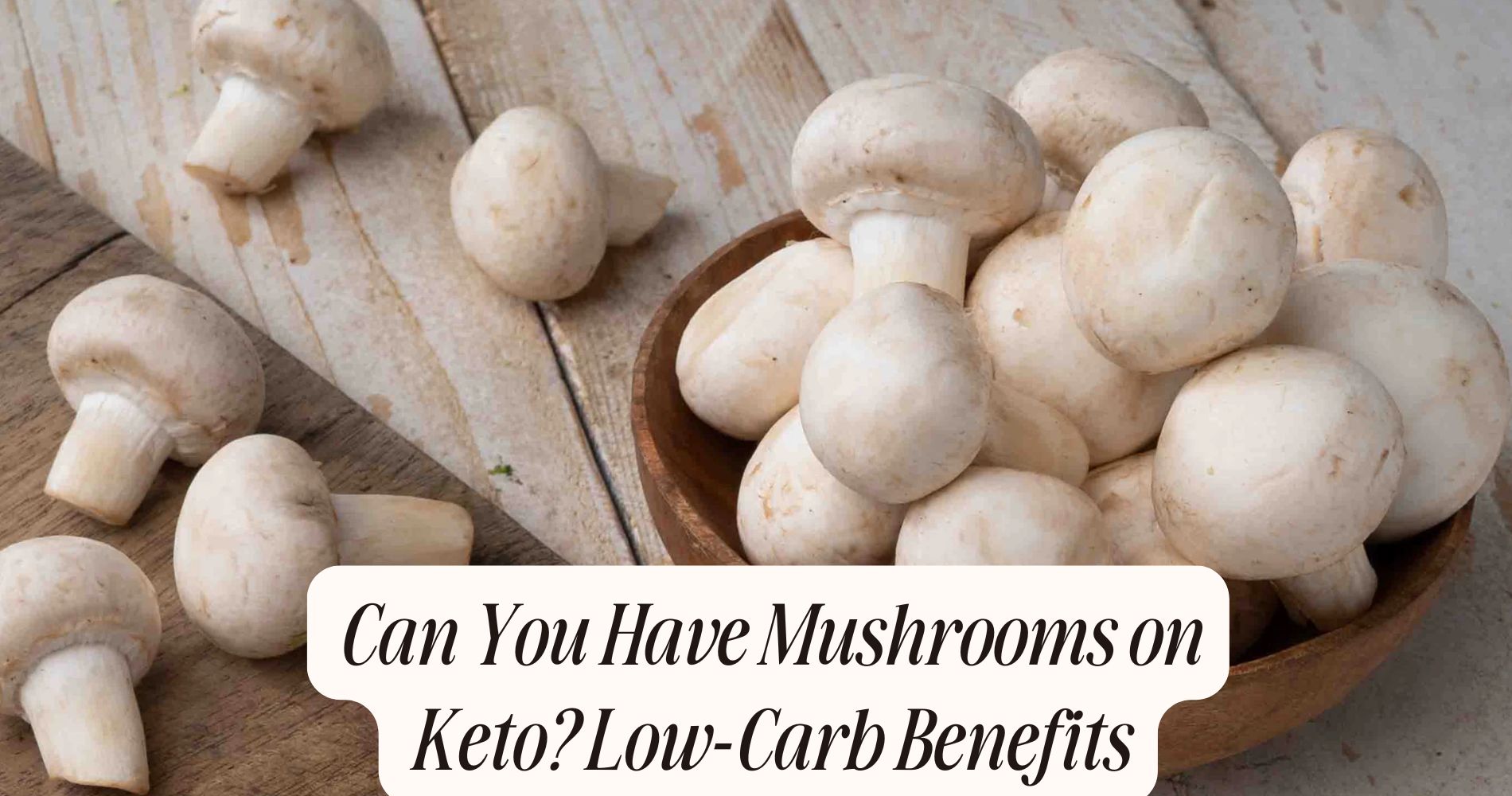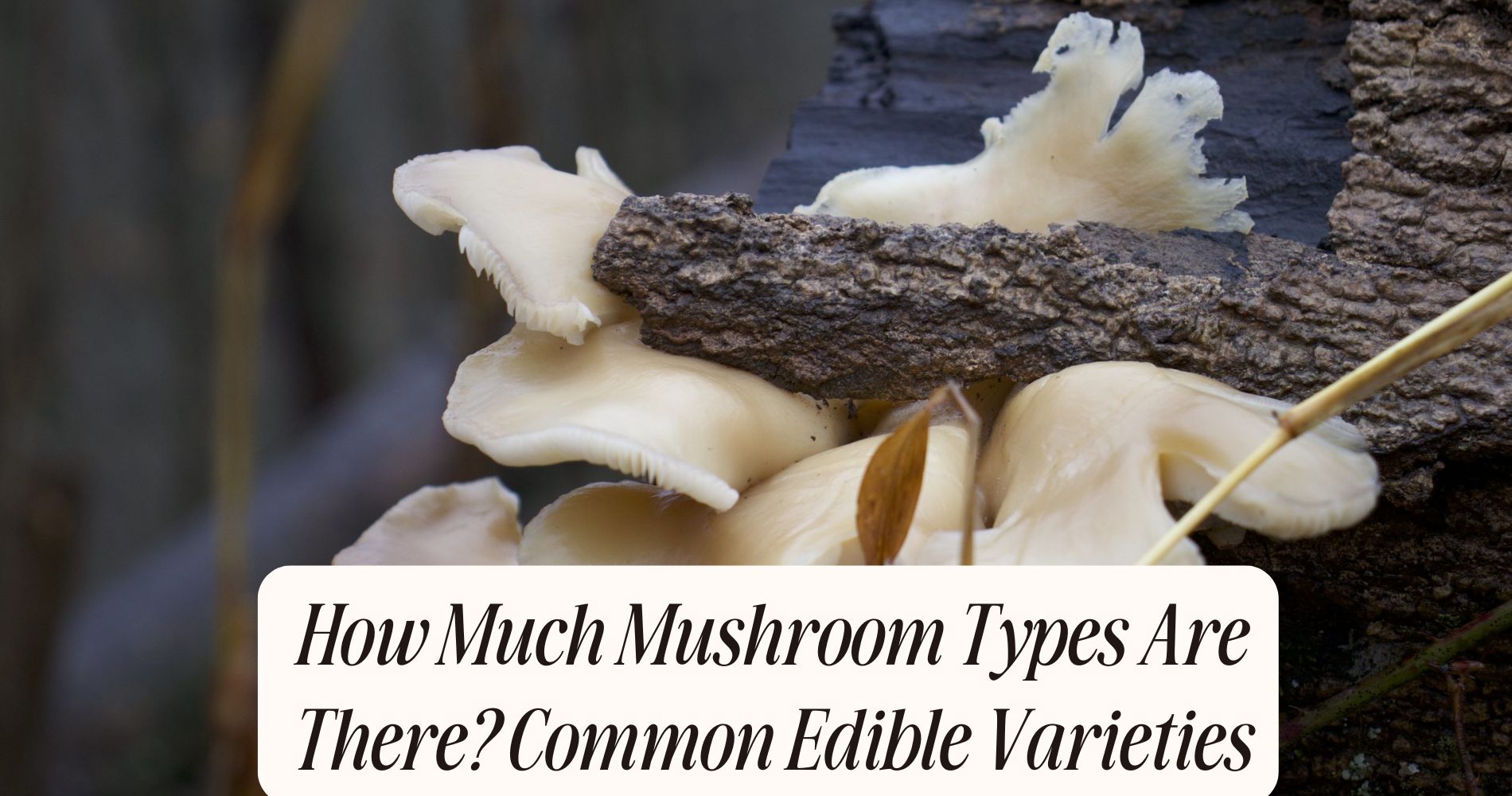
Is Mushroom a Protein Food? Truth About Its Nutrition
Is mushroom a protein food? Mushrooms aren’t a primary source of protein, but they can surprisingly complement your diet. Depending on the variety, such as shiitake or portobello, they contain about 2.2 to 3.3 grams of protein per 100 grams. While their amino acid profile isn’t complete like animal-based proteins, mushrooms are low in calories and rich in vitamins and minerals. This makes them a nutritious addition to meals. Learn more about how to incorporate mushrooms effectively into your diet.
Understanding Mushroom Varieties
When considering whether mushrooms can be classified as a protein food, it’s essential to understand the different varieties available.
Mushroom taxonomy categorizes these fungi into several groups, with a focus on edible varieties like Agaricus bisporus (white button) and Pleurotus ostreatus (oyster mushroom). Each variety has unique characteristics, flavors, and culinary applications.

For instance, shiitake mushrooms are known for their rich taste, while portobellos offer a meaty texture. Understanding these distinctions helps you appreciate their versatility in cooking.
While mushrooms aren't high in protein compared to other sources, their nutritional profiles can complement a balanced diet.
Recognizing the edible varieties and their classifications enhances your knowledge and culinary skills, allowing you to make informed choices in your meals.
Nutritional Breakdown of Mushrooms
When you look at mushrooms, their nutritional profile reveals more than just their unique flavors.
You'll find they contain a modest amount of protein, along with essential vitamins and minerals that contribute to overall health.
Understanding these components can help you assess their role in your diet.
Protein Content Analysis
Mushrooms typically contain about 3 grams of protein per 100 grams, making them a modest source of this essential macronutrient.
Different mushroom species, such as shiitake and portobello, can vary slightly in protein content, but generally, they don’t compete with traditional protein sources like meat, legumes, or dairy.
While mushrooms are low in calories and can contribute to your daily protein intake, relying solely on them for protein isn’t advisable. Their amino acid profile is also less complete compared to animal-based proteins.
If you're looking to boost your protein consumption, consider incorporating a variety of protein sources alongside mushrooms to achieve a balanced diet.
To conclude, mushrooms can complement your meals but shouldn't be your primary protein source.
Vitamins and Minerals Overview
In addition to their modest protein content, mushrooms are packed with a variety of vitamins and minerals that contribute to overall health.
Their vitamin content includes B vitamins like riboflavin and niacin, essential for energy metabolism. You'll also find vitamin D in certain varieties, supporting bone health and immune function.
The mineral benefits are notable too; mushrooms provide selenium, copper, and potassium, which play crucial roles in antioxidant defense, red blood cell production, and blood pressure regulation, respectively.
This impressive nutrient density makes mushrooms an excellent addition to your diet, enhancing your meals while promoting various health contributions.
Protein Content in Different Mushroom Types
How much protein can you expect from different types of mushrooms? The protein content varies considerably among mushroom types, making it essential to evaluate your dietary preferences.
For instance, white button mushrooms contain about 3 grams of protein per 100 grams, while shiitake mushrooms offer around 2.2 grams. Portobello mushrooms provide approximately 2.5 grams.

If you’re sourcing mushrooms for a protein boost, contemplate varieties like oyster mushrooms, which can contain up to 3.3 grams.
While mushrooms aren’t a primary protein source, they can complement your diet. Integrating a variety of mushrooms can enhance your nutrient intake, making them a valuable addition to meals, especially for those following plant-based diets.
Amino Acids Found in Mushrooms
When you consider mushrooms as a protein source, it’s important to analyze the amino acids they contain.
Many mushrooms provide a range of essential amino acids, which are vital for your body's protein synthesis.
Essential Amino Acids
Although mushrooms are often overlooked as a source of protein, they contain several essential amino acids that are vital for your body’s overall health.
These amino acids, which your body can't produce on its own, include leucine, valine, and threonine, making mushrooms a valuable addition to your diet.
While mushrooms may not be a complete protein source when compared to animal products, they can complement other protein sources effectively.
In a complete protein comparison, mushrooms can fill gaps in your diet, especially for vegetarians and vegans.
By incorporating mushrooms into your meals, you can diversify your essential amino acids sources, helping you meet your nutritional needs more effectively.
Protein Quality Comparison
Mushrooms offer a unique protein profile that can be quite different from traditional protein sources like meat, dairy, or legumes. While they contain essential amino acids, their overall protein quality varies.
Research indicates that the protein digestibility of mushrooms may be lower compared to animal-based proteins, meaning your body mightn't absorb them as efficiently. However, certain varieties, like shiitake and oyster mushrooms, show promising protein quality due to their balanced amino acid composition.
They can contribute to your daily protein intake, especially in vegetarian or vegan diets. To optimize your nutrition, consider pairing mushrooms with other protein sources to guarantee you’re meeting your amino acid needs effectively.
Health Benefits of Including Mushrooms in Your Diet
Including mushrooms in your diet can greatly enhance your overall health. These fungi are low in calories yet rich in essential nutrients, making them a smart choice for dietary inclusion.
Research highlights various mushroom benefits, such as boosting your immune system and reducing inflammation. They’re a great source of antioxidants, which help combat oxidative stress in your body.

Additionally, mushrooms contain B vitamins, vital for energy production and brain health. Some varieties, like shiitake and maitake, even support heart health by improving cholesterol levels.
Comparing Mushrooms to Traditional Protein Sources
When you compare mushrooms to traditional protein sources, you'll notice significant differences in protein content and nutritional profiles.
While mushrooms offer unique vitamins and minerals, they typically contain less protein than meat, dairy, or legumes.
However, their culinary versatility makes them an appealing addition to various dishes, enhancing both flavor and nutrition.
Protein Content Comparison
While many people consider traditional protein sources like meat, dairy, and legumes as staples in their diets, it’s important to explore how mushrooms stack up against these options.
Mushrooms typically contain about 3 grams of protein per 100 grams, which is noticeably lower than chicken or beef, often boasting 25-30 grams.
However, it’s essential to debunk some nutritional myths surrounding mushroom protein. While they may not be protein powerhouses, they offer unique amino acids and can complement protein-rich foods in a balanced meal.
Incorporating mushrooms into your diet enhances flavor and offers vitamins and minerals, making them a valuable addition.
Ultimately, while they can’t replace meat or legumes entirely, mushrooms can contribute to your overall protein intake in a diverse diet.
Nutritional Profile Highlights
Mushrooms may not offer the same protein punch as chicken or beef, but their nutritional profile reveals several benefits that make them remarkable in a balanced diet.
Unlike traditional protein sources, mushrooms are low in calories and fat while being high in essential vitamins and minerals. They provide a good source of B vitamins, particularly riboflavin and niacin, which support energy metabolism.
Additionally, mushrooms contain antioxidants like ergothioneine, which may help combat oxidative stress. Their unique fiber, beta-glucans, can promote gut health and boost immunity.
While they’re not a primary protein source, the mushroom benefits lie in their ability to enhance nutrient absorption and add depth to meals, making them a valuable addition to your diet.
Culinary Versatility Analysis
Although traditional protein sources like chicken and beef dominate protein-rich diets, mushrooms showcase remarkable culinary versatility that can elevate a wide range of dishes.
You can explore various mushroom cuisines, incorporating them into gourmet recipes that enhance flavors and textures. For instance, sautéed mushrooms can replace meat in pasta dishes, providing umami depth. Their ability to absorb flavors makes them ideal for marinating, grilling, or roasting.
Unlike conventional proteins, mushrooms offer a lower calorie alternative, appealing to health-conscious eaters. Additionally, their diverse varieties—like shiitake, portobello, and oyster—allow for creative adaptations in both vegetarian and omnivorous meals.
Cooking Methods and Their Impact on Nutrition
When it comes to maximizing the nutritional benefits of mushrooms, the cooking methods you choose can greatly influence their health properties.
Roasting mushrooms enhances their umami flavor while preserving nutrients, making it a favored method. Sautéing offers similar benefits, allowing for quick cooking that retains essential vitamins.

On the other hand, boiling has significant drawbacks, as it often leaches nutrients into the water. Grilling adds a smoky flavor but may cause some nutritional loss. Frying techniques can introduce unhealthy fats, diminishing health benefits.
Steaming methods are excellent for retaining nutrients, while baking outcomes depend on the temperature and duration.
Ultimately, understanding these cooking methods can help you enjoy mushrooms while maximizing their nutritional retention.
Incorporating Mushrooms Into Plant-Based Diets
Incorporating mushrooms into your plant-based diet not only enhances flavor but also boosts nutritional value. These versatile fungi offer essential vitamins, minerals, and antioxidants, making them an excellent choice for plant-based integration.
For instance, you can create hearty mushroom recipes like stuffed portobellos or mushroom stroganoff, which provide depth and umami flavor to meals. Additionally, mushrooms are low in calories and high in fiber, supporting digestive health while helping you feel fuller longer.
Myths and Misconceptions About Mushrooms as Protein
While many people view mushrooms as a mere vegetable, this perception often leads to misunderstandings about their protein content. A common myth is that mushrooms lack significant protein, but this is a nutritional misconception.
In fact, certain varieties, like shiitake and portobello, contain around 3 grams of protein per 100 grams, contributing to your daily intake. Myth debunking reveals that while mushrooms aren’t a primary protein source, they can complement a balanced diet. Their protein quality varies, but they offer essential amino acids.
Additionally, mushrooms are low in calories and rich in vitamins, making them a nutritious choice. Embracing mushrooms as a protein-friendly food can enhance your meals without overshadowing other protein sources.
Tips for Selecting and Storing Fresh Mushrooms
Understanding how to select and store fresh mushrooms can greatly enhance their nutritional benefits and flavor in your meals.
When it comes to fresh mushroom selection, look for firm, plump mushrooms with a smooth surface and no blemishes. Avoid those that are slimy or have dark spots, as these indicate spoilage.
For proper mushroom storage, keep them in a paper bag in the refrigerator instead of plastic, which can trap moisture and lead to faster deterioration.
Make sure to consume them within a week for ideal freshness. By following these simple tips, you can guarantee that your mushrooms remain flavorful and nutritious, elevating your dishes while maximizing their health benefits.
Beyond Protein: Full-Spectrum Wellness with SUPER MUSHROOM GUMMIES
While exploring the question is mushroom a protein food, you’ll find that mushrooms offer far more than just modest protein content. For a convenient way to harness the full power of functional mushrooms, try Well Gummies' SUPER MUSHROOM GUMMIES. Each vegan-friendly gummy delivers a blend of 10 potent mushrooms to support brain function, calm energy, and immune balance—all without cooking or prep. With a fresh wild berry flavor and no jitters or crash, they’re as enjoyable as they are effective. Nourish your body the smart, flavorful way with Well Gummies!
Frequently Asked Questions
Are Mushrooms Suitable for All Dietary Restrictions?
Mushrooms can fit many dietary restrictions, offering various benefits. However, be cautious of mushroom allergies. They’re generally safe for vegetarians and vegans, but always consult with a healthcare professional if you have specific dietary concerns.
Can Mushrooms Replace Meat in Meals Effectively?
Mushrooms can effectively replace meat in meals due to their unique texture and umami flavor. They serve as excellent meat alternatives, adding depth to dishes while providing essential nutrients, making them a versatile choice for various diets.
Do Mushrooms Contain Gluten?
Mushrooms, including various types like button or shiitake, don’t contain gluten, making them safe for those with gluten sensitivity. They're a nutritious addition to your diet, providing flavor and texture without gluten-related concerns.
How Should Mushrooms Be Washed Before Cooking?
To wash mushrooms, you can use cleaning techniques like gently wiping them with a damp cloth or rinsing briefly under cold water. Avoid soaking methods, as they can make mushrooms soggy and less flavorful.
Are There Any Side Effects of Eating Mushrooms?
Eating mushrooms can cause side effects like mushroom allergies and digestion issues in some individuals. It's essential to monitor your body's reactions and consult a healthcare professional if you experience any adverse effects after consumption.
Conclusion
Incorporating mushrooms into your diet can boost your nutrition, but they shouldn't be your sole protein source. While they contain some protein and essential amino acids, their overall protein content is relatively low compared to other sources. Understanding the various types of mushrooms and their nutritional profiles is key to maximizing their health benefits. So, enjoy mushrooms as a flavorful addition to your meals, but pair them with other protein-rich foods for a well-rounded diet.




